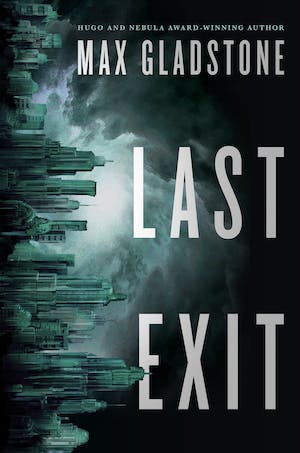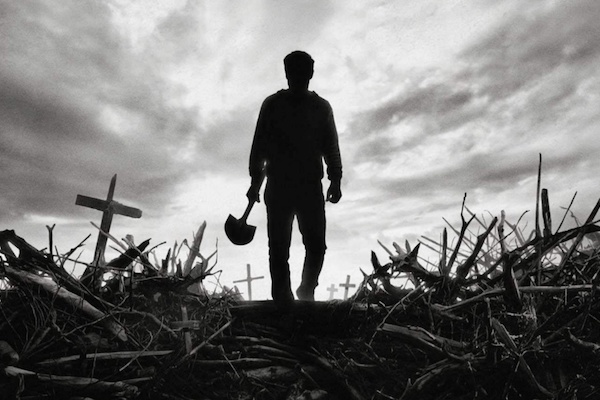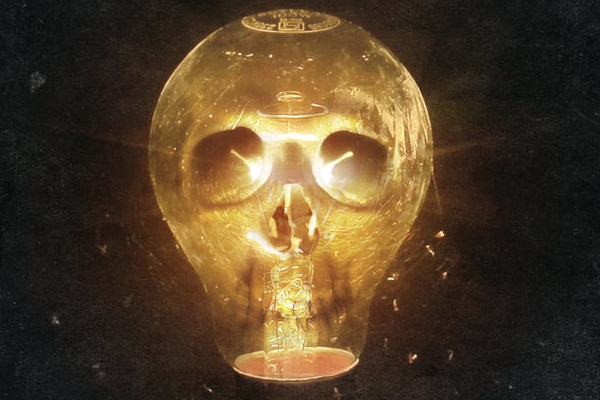Welcome back to Reading the Weird, in which we get girl cooties all over weird fiction, cosmic horror, and Lovecraftiana—from its historical roots through its most recent branches. This week, we continue Max Gladstone’s Last Exit with Chapters 19-20. The novel was first published in 2022. Spoilers ahead!
“In Wyoming, the wind split stone and carried houses off, stole topsoil by the ton and rocked monstrous great mining plants on their building-sized legs, but the wind did not shake the Medicine Wheel.”
Ramon and Zelda have landed in the parking lot of a 7-Eleven sporting luminescent algae blobs uncomfortably shaped like humans. Under a cracked sky, they argue about whether they should head for the Medicine Wheel or search the alts for June, Sarah and Ish. Ramon points out that they’ll be lucky to get one more trip out of the damaged Challenger, so the Medicine Wheel it is.
The Challenger makes it to within a quarter mile of the Wheel; Ramon and Zelda push it the rest of the way. This version of the Wheel sits atop Wyoming’s Dry Fork Ridge, overlooking an endless pine forest, itself overgrown and abandoned by all but the wind. No animals, even insects, venture near. Some cities and holy sites have echoes in other realms. New York, for example, exists in most alts, but the Medicine Wheel is in every alt, always basically the same: A ring of white stones with spokes radiating from the center to the circumference. In some places, it’s revered, in others forgotten. Always one of its spokes points to the North Star. Always except, for some unfathomable reason, back in the alt-riders’ home world.
They found the Wheel after a year of unsuccessfully hunting for the crossroads. The alts they visit are invariably ruined, but each has its tales of a “shining citadel” where people flew and tears were never shed. Sometimes the alt-riders even found a crystal city ringing with the “ethereal laughter of children.” The children, however, were not to be found, and after all, one’s kingdom could be kept free of weeping if only you surgically removed everyone’s tear ducts.
Long debate failed to provide answers about the Wheel. Could a place have a mind, gather spin, hop between worlds as they did? Sal wanted to try communicating with it, but then she was always the one pushing to investigate an alt and help its inhabitants, altruism that often landed the friends in trouble. Zelda always wanted to move on toward the “grail” of the crossroads—where they’d find the power to make all things right.
Sal’s mind was made up. One night she went into the Wheel alone. Now, with Ramon, Zelda remembers how clouds swallowed the moon and the wind bore all that world’s rot to them. Lightning came for Sal, forcing Zelda to rescue her. Ramon reminds Zelda that Sal almost died in the Wheel, and admitted that she didn’t even see the crossroads. Zelda says “The princess did.” Ramon counters that the princess still couldn’t reach the crossroads. But Elsinore holds the only other road to their ultimate destination.
Ramon knows that if they step into the ring, storm and rot will come. He says they need to wait a day for the others and talk the next step through. If the Wheel’s the only way, they’ll walk it together. “Together,” Zelda agrees, but the brave word sounds hollow under the cracked sky.
* * *
The other riders have hitched away from the cowboy’s posse to an abandoned amusement park. Crucified bodies, some three-armed, flank the entrance, but whatever “hate-pride biker gang” once ruled here has “chewed itself to death.” Not a cozy camping spot, but at least the structures provide firewood and cover.
June sleeps restlessly on one side of their fire—she collapsed after the hitch, spent by her efforts. Ish paces a near-circle around the fire, always avoiding June. He and Sarah continue their argument about June’s “knack” of summoning rot. Ish is convinced the girl’s a danger, while Sarah defends her. The exchange devolves into Sarah blasting Ish for his high-tech campaign to monitor rot in their own world. Ish blasts Sarah for running away from the fight to the safety of a medical degree and suburban soccer games. Both are too tired to fight for long. The alts are worse now, aren’t they, Sarah asks. Her elders knew how bad they could get; now Sarah knows, and she wonders if back in college they were “too young and dumb to see that we lost the war before we were born.”
Once, back then, when Sarah and Ish were lost together, their mutual terror and despair drew them together like magnets. They had sex in “fields of glass,” under “a toxic aurora sky.” Sarah later realized the consolation of the act was not tenderness, but surrendering to a merely physical release, no more meaningful than what occurred “with any number of forgettable college dorm room nights.” When Ish tries to embrace her now, Sarah pushes him away. Parted, they watch each other in silence. Sarah admits to herself that the way she has walled her despair up with purpose, vows, love and work has not been good or right. She knows that others build similar walls, and she’s tried to let that realization make her kind—but still.
Ish says he’s sorry first. They aren’t sorry, though, Sarah thinks. It’s just hard.
Fighting the Rot (or Maybe the Cowboy): We’re helping redwoods migrate.
What’s Cyclopean: Empty cities built for people fourteen feet tall at the shoulder. If those people (now absent) had one eye each, the term becomes even more appropriate.
The Degenerate Dutch: Etymology is “a right-handed man”, in English at least, preserving its biases in words like “sinister.”
Anne’s Commentary
I was hoping that in Chapter Nineteen everyone would arrive at the Medicine Wheel and get on with their quest already. Okay, so Zelda and Ramon do get there after a ride made harrowing less by “wolf-haunted forest alts” and “empty cyclopean cities built” than by the accelerating decline of the Challenger. Gladstone’s right to truncate this bout of alt-hitching; Chapters Sixteen and Eighteen served up enough gruesome ruined-worlds action to last us a while. To last me a while, anyway, while Chapter Seventeen provided useful backstory about the group’s first attempt to reach the crossroads.
After rereading Nineteen, I see it was better for only one pair of the separated alt-riders to land at the Wheel in this chapter. Gladstone’s first priority must be to describe this pivotal structure: its always-the-same-but-different appearance, its properties, a brief history of the alt-riders’ previous experiences with the Wheel and the theories they’ve devised about it. To have all five characters together—and inevitably arguing and angsting—would have detracted from our introduction to the omnipresent circle of white stones and radiating spokes. Bits of character development slip in smoothly, as in the contrast established between activist-in-all-alts Sal and crossroads-fixated Zelda. Also nice is Ramon’s little epiphany about how he and Zelda are both “erratics”—in geological terms, rocks borne far from home by glaciers, “big stones moved only in disaster.” He and Zelda thus share a bond that his desertion could break but not destroy.
Chapter Nineteen closes with a fresh reference to an alt-destination called Elsinore. Elsinore is the English name for Helsingor, the Danish city in which Shakespeare set Hamlet. Gladstone’s Elsinore has a princess who’s seen the crossroads and perhaps, like Sal, “a better place. A future.” Shakespeare’s Elsinore boasts not an actual princess but a coulda-been one, if Ophelia had lived to marry her suitor, Prince Hamlet. Which she didn’t, having instead descended into floral-bedecked madness and drowned herself, maybe by intention, maybe by accident. But wait, there’s also a 2019 video game called Elsinore, in which the player character Ophelia has prescient visions of the carnage at the end of Shakespeare’s play: SPOILER ALERT – Pretty much everyone dies, and Ophelia kicks it a few scenes back, off-stage to add to her other humiliations.
In the game, Ophelia operates in a four-day time loop (always restarting at her death) during which she tries to prevent the tragic ending. There are thirteen possible outcomes, which makes me think of the multiple outcomes of Last Exit, represented not by time loops but by infinite alternative worlds. Elsinore’s outcomes differ widely in Tragedy Level, whereas all the alts the friends have visited so far have suffered calamitous ones (from a human point of view.) I wonder if the princess in Gladstone’s Elsinore might be “related” to the game-Ophelia in her unique position to change the future, albeit through intermediaries like the Yale alt-riders.
All right, so it’s really Chapter Twenty that had me itching for everyone to get on with it already. Everyone being Sarah and Ish, since June contributes nothing from her sleeping bag but the intermittent twitch or moan. Ish is still in the throes of paranoia over June’s rot-based knack, while Sarah still defends the girl, basing her advocacy on the simple fact that June saved their lives. I wanted Ish to calm the hell down and give Sarah—and June—a break. Admittedly, if anything could justify paranoia in a rot-fighter, it would be the summoning of rot by a supposed ally, and so I guess I should cut Ish some slack for carrying his rants across chapters. Nor is it unbelievable that Ish and Sarah’s argument over June should deteriorate into the same old accusations and resentments. Ish tells Sarah to grow up. She tells him he doesn’t know what growing up looks like. At least Ish has been doing something to save people from falling through the serpent-generated cracks in the world, while Sarah’s been running from the truth into the cardboard comfort of “normality.” Sarah’s counter is that she’s doing what her father, her people, have done before her, “put on new spots” to blend in, while knowing core-deep, from history, “what the alts were.” She’s the one facing the terrible questions: what if their fight was never winnable, or worse, what if it was and they’d had their chance but lost?
Huh. My first-read annoyance with Ish and Sarah for just sitting around airing grievances seems to be fading into appreciation for how Gladstone has taken time to clarify their differing reactions to a mutual dilemma—and their mutual reaction to a particular terrifying episode among the many of their alt-riding past. Stress made strange sex partners in the “fields of glass” alt; so here’s the Sarah-Ish connection hinted at earlier! But for Sarah at least, it was a connection of “meat and juice and sweat” only, another way to wall herself from despair, but one less forgivable than the walls of “vows and love and work” perhaps. At any rate, it’s a connection that Sarah and Ish don’t fall into a second time. Instead they focus on what’s clearly a good thing, gathering more firewood even though they already have enough.
Can you ever have too much warmth and light out in the alts?
Ruthanna’s Commentary
This week, I kept a catalog of world-ending disasters mentioned in passing, and estimated their likelihoods: atomic war (probably common given all our world’s near misses), zombies (probably common given our fictional obsessions), plague and air pollution (both all too ubiquitous), gray goo (requires software that never crashes), werewolves (requires a miracle or magic), supervolcanoes (hate ‘em, don’t wanna think about it), gravity failures (very curious how that happened). There are cities where no one cries because their tear ducts are surgically removed (ouch), and fiefdoms with microchipped technoserfs (unpleasantly plausible), and the dead amusement park with mummified bodies—three-armed, yet—crucified near the entrance (described in a paragraph that includes literal and figurative roller coasters). Some alts are lifeless; others host people who can still benefit from seeds and antibiotics.
Will any of these worlds ever recover? Our Earth’s been through at least five mass extinctions not counting the Great Oxygenation Catastrophe or the in-progress depredations of the Holocene, killing about 70-90% of species each time. (Wikipedia nightmare fuel rabbit hole here.) And each time, life returns—it may take millions of years, but on a world where the air’s still breathable to something, evolution ultimately restores diversity. But this supposes no extradimensional rot, no magical limit on further growth or goodness. It also supposes an extremely long-term perspective.
Side question: what’s up with all those dinosaurs? Why are we counting the elimination of an extinction event in with all the new extinction events? Maybe the dinos are actually Jurassic Park style failures of humanity to consider whether they should as well as whether they could. (You totally should. Just start with small herbivores and don’t let the capitalists take over; also talk to an actual zookeeper.)
We hear a lot about what’s consistent across alts. Apocalypse is one constant; another, it turns out, is the Medicine Wheel. Sarah named it—the only one of the gang with the right to bestow such a name—but no one’s comfortable with it. Still, given last section’s hints about the cowboy, the might be more accurate than they know. If America is a cowboy riding 500 years of genocide and conquest, doesn’t it make sense that there would be something older and unbreakable—a survivor of that conquest? The Wheel always points toward the North Star, except in our own world. Because our own world hasn’t yet settled into apocalyptic stasis?
Maybe it’s the leftovers of that long-term perspective, but I’m a bit weirded out by the idea of the North Star as a symbol of constancy here. After all, we had a different North Star (Thuban in the constellation of Draco, to be specific) less than 5000 years ago, well after humanity came to North America. Presumably the wheel points to whatever’s in the appropriate position, but still.
Back to life’s recovery: Sarah speculates about whether there was ever a real chance for the gang to save the world. It’s a double-edged sword of a question: they don’t want to have deluded themselves, but they also don’t want to have failed on something that consequential. Helplessness is at least relaxing; if there’s nothing you can do then there’s nothing that you need to do.
Except that helplessness is an illusion: there’s always something you can do. Ish and Sarah don’t agree on what that thing is, but they’ve both been doing their own version of it. Sarah’s made small safe spaces, living a good if constrained life—walling up despair with purpose and friendship, and trying to be kind. Ish has decided that if you aren’t making big dramatic tradeoffs and selling your soul, you aren’t really making a difference—but even if he’d never admit to such an emotional, individual motivation, I suspect it’s because that’s what Sal did.
Ish won’t acknowledge that Sarah’s acts matter, but not all consequential action is dramatic. That may be even harder to see then usual after your fifth fight with cannibal zombies.
Next week, join us for a cup of eggnog and a Christmas haunting in E. F. Benson’s “Between the Lights”.















Loving the time Gladstone takes to explore these characters and their trauma. There is so much adventure going on in the past and the background that part of me would love to see, but that’s not what this book is about.
Just commenting to say I’m really appreciating these posts and a fresh take on a book by an author criminally under-read in the UK.